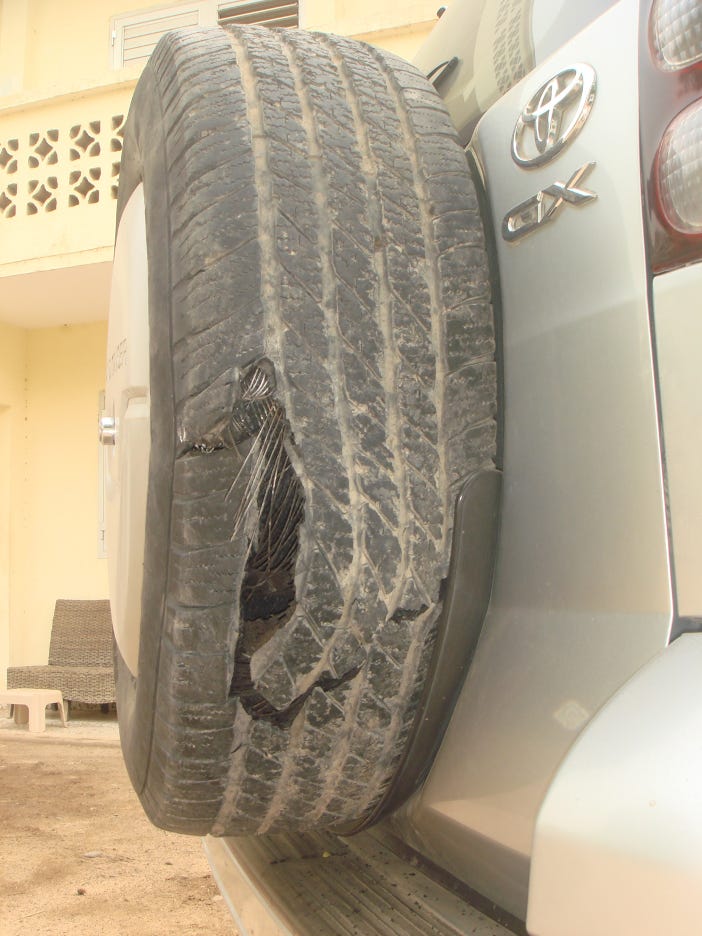This is Part 2 to The Parable of the Wounded One. You can find Part 1 here.
Here is a quick story of what this looked like for me just a few weeks ago, when I was the Wounded One.
In February I spoke at Crown College in Minnesota. I talked about the story of the Wounded One and then I drove home. I try to turn the story of the Good Samaritan upside down, encouraging especially American Christians to recognize ways we are not always the helper, giver, or savior, but that we are sometimes the one in need of help. Even service can come from a posture of triumphal overlording, if we refuse to acknowledge our own weakness and need.
Anyway…
Within about 10 minutes of starting for home, I nailed a pothole in the road. Like a serious pothole. The kind that would swallow a camel in Djibouti. Or a GTI Golf in Minnesota. I know how to avoid them in Djibouti, could practically drive down our road with my eyes closed and tell you every bump and hole. But I was not expecting one on Highway 7 at 55 mph.
Nailed it.1
Popped the front driver’s side tire and dented the rim of the car.
It was a mess.
I pulled over and got to work changing the tire.
(this is a popped tire in Djibouti, not Minnesota. It actually exploded like this while sitting on the back of the car in the sun on a hot summer day. We were inside the house and heard the POP. That’s how hot it was there.)
I could not figure out how to change that stinking tire. It is a newish car, more techy than the old Land Cruisers I’m used to that we drove in Africa.
A driver pulled up behind me and a White, Christian, American man got out. He was one of the other speakers who had been at Crown with me. We met over lunch.
“I actually don’t know how to change a tire,” he said. “Should probably learn!”
He offered to give me a ride somewhere but I preferred to stay with the car and figure it out, so he drove on. Even though he couldn’t help, it was kind of him to stop.
I got on the phone to call roadside assistance when another car pulled up and another man jumped out, a Brown man with a thick, non-American accent.
“Help?” he said.
“Yes!” I said.
He got right to work where I had left off and boom bang boom, tire was changed. It was so fast and he kept smiling the whole time. Huge grin on his face. We talked a little bit, but his English wasn’t strong. I learned that he is a newly arrived immigrant from Turkmenistan and has been in the USA for five months.
Newly arrived immigrant.
From Turkmenistan.
All I kept thinking was, I am so glad you are here.
Turkmenistan is 89% Muslim.
It is likely I had a Muslim Good Samaritan.
He was so kind and so thoughtful. He even gave me baby wipes to wash my hands and made sure that I got safely back onto the super-busy road before pulling out behind me and waving me on my way.
I teared up as I drove the rest of the way home.
This was exactly what I had just been talking about at Crown College, exactly what I have experienced over my twenty years in the Horn of Africa. I have been neighbored and served over and over by the Muslims in my life, both Muslims I know as friends and Muslim strangers who pull up beside my flat-tired-car.
I am so glad they are in my life.
I am so glad they are here.
When have you been served by a Good Samaritan you weren’t expecting?
Why do you think we always imagine ourselves as the one to help, not the one in need?
When is the last time you looked at a newly arrived Muslim immigrant and thought, I’m glad you are here?
Next week Part 3: The Women in the Story of the Great Commandment and the Wounded One
Yes, we submitted a claim to the city. They replied that because they had no “previous knowledge” of this pothole, they cannot be held at fault. So I guess just deny you know anything ever is the lesson? I don’t know how it is my fault that there was a pothole that dangerously large in my lane on a major highway. If I’d been in our Jeep, I probably would have rolled the car. And no, I wasn’t speeding. I was, impatiently, stuck following behind two large trucks that couldn’t get up to speed.





And why do we equate needing help as a failure on our part? Do we think we should know how to avoid every trouble, how to do everything thing to remedy any situation? (I’ll be taking out my own diseased appendix.) How many people have we deprived of being blessed because we didn’t let them help us?
You and me both Rachel. so so so many beloved muslim good samaritans in my last few decades. it makes a huge difference on my outlook today. hugs to you